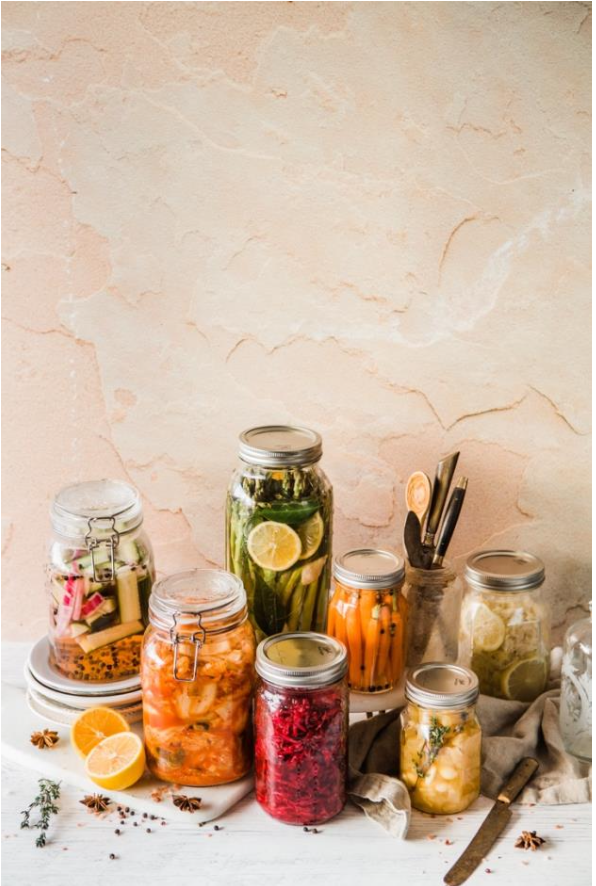
The single most important factor in supporting our immune system comes down to the quantity and diversity of good bacteria in our gut. Alterations in the communities of healthy bacteria in the gut can encourage illness and autoimmune diseases. It’s not only crucial but necessary to support our gut health and, in turn, our immune health. Between cold and flu season, seasonal allergies, and the ongoing COVID-19 pandemic, there are many reasons to boost the immune system this year.
What is the gut microbiome?
When we talk about “bacteria”, most people think about bad germs that need to be eliminated. After all, bacteria are the culprit behind some serious illnesses like pneumonia, meningitis, and food poisoning. They’re the reason why we earnestly disinfect our hands, high-touch surfaces such as countertops, bathroom sinks, and other places where germs can accumulate. Yet, not all bacteria are bad guys. In fact, the human body is home to 100 trillion microscopic “good” bacteria made up of more than 500 species, most of which reside in our gut and are collectively known as the microbiome or gut flora. With “micro” meaning very small and “biome” meaning ecosystem, our gut microbiome is essentially the community of tiny, but populous organisms that live inside our bodies. Small in size but mighty in number, there’s a ratio of at least one gut bacteria cell for every human cell!
The human body is home to 100 trillion microscopic “good” bacteria.
Gut Health is Immune Health
Researchers are now confirming what holistic practitioners have known for thousands of years, the health of our gut has a profound effect on the immune system. For all of human history, we have had a symbiotic relationship with bacteria and they’re incredibly essential to our very survival. A whopping 70-80% of immune cells reside in the gut! Scientists confirm the crucial role of good bacteria in our gut; they help our bodies digest food to produce necessary energy, make important vitamins for mood such as the B-vitamins, and stimulate the immune system to keep harmful pathogens at bay.
Dysbiosis and Immunity
The good and bad bacteria work together in your body, but they need to be balanced. A poor balance of gut bacteria is called dysbiosis and this is when the unhelpful gut bugs outnumber the good ones. In this imbalanced state, there will not be enough friendly bacteria to keep you healthy, making the body prone to chronic inflammation and illness. Lifestyle choices that throw off this balance include:
- A poor diet – not enough plant foods, excess processed sugars and preservatives, pesticide-laden crops, hormone-fed animals
- Medications – liberal use of antibiotics, pain killer NSAIDs, PPIs, steroids, chemotherapy drugs
- Infections – pathogens, parasites, viruses, opportunistic bacteria
- Stress – acute and chronic stress, physical stress, surgery
- Chemicals in environment – sanitizers, pesticides, cleaning chemicals, personal hygiene products, xenoestrogens
We don’t want to wait until we get sick before we act. By taking good care of our gut, we are arming our bodies with good bacteria needed to help protect us, especially during cold and flu season. Looking to boost the immune system? Look to the gut!
The good news is that it’s never too late to start building up our microbiome. We can fight inflammation and influence our immunity through healthy diet, lifestyle changes, and targeted supplementation.
Looking to boost the immune system? Look to the gut!
How to build a healthy microbiome
An easy way to build up healthy gut bugs is to eat more foods these bacteria like to eat – fibre! Fibre is a type of complex carbohydrate, the good kind of carbs you want as they provide abundant fuel for the good bacteria to work their magic. Studies have shown that a fibre-deficient diet results in a reduced inner intestinal mucus layer. Loss of this protective mucus layer allowed bad bacteria to gain closer proximity to the bowels, triggering inflammation.
Increasing your intake of dietary fibre from plant sources include:
- Veggies
- Fruit
- Legumes, beans, peas
- Nuts and seeds
- Whole grains
Another great way to promote a healthy microbiome is to consume foods containing good bacteria themselves. This includes fermented foods such as yogurt, sauerkraut, kimchi, kombucha, kefir, unpasteurized pickles, miso, tempeh, and natto. These foods are considered to be probiotic – meaning they supply your gut with a therapeutic dose of good bacteria. These foods are amazing to incorporate into everyday meals.
Recipes

Looking for some microbiome-boosting recipes? Try one of these this week!
This is a delicious, fermented tea drink that can be a great replacement for sugary sodas. It’s lightly effervescent and best of all, you can flavour kombucha with your favourite fruits. It is full of probiotics, active enzymes, high in B-vitamins for an extra energy boost, and super-charged with antioxidants. You only need a handful of ingredients – try it out!
Raspberry Yogurt Bark with Dark Chocolate Drizzle
What’s gluten-free, nut-free, but still a delicious snack? Yogurt bark, of course! This healthy treat is perfect for satisfying munchy cravings. Plus, it’s just really stinkin’ delicious! You’ll get the benefits of probiotics from yogurt, the satiating factor from the protein and fat, as well as the tart yummies from the raspberries.
This is the perfect make-ahead snack that takes no time at all, stores well, and your gut will absolutely love this. With only 4 ingredients, this probiotic-rich, high-protein, gluten-free recipe will help boost the immune system in no time.
While maintaining a healthy gut with food is truly front-line treatment, to really boost the immune system during times of increased need (like cold and flu season), probiotic supplementation may be needed.
Enter, probiotic supplementation
Probiotic supplements are made of live, active, and beneficial bacteria that naturally live in your gut. By adding to the number of good bacteria, probiotics tip the scales towards a healthier, more robust microbiome and in turn, promote immunity. And though the idea of gulping down live bacteria might seem – literally and figuratively – a bit hard to swallow, studies show that probiotics can help resolve and prevent uncomfortable tummy upsets in addition to keeping bowels happy. This makes for a happy, healthy and optimally functioning immune system that’s ready to brace cold and flu season.
Not all probiotics are created equal.
Not all probiotics are created equal. Some strains support the immune system more effectively than others. There are more than 500 different species of microorganisms living inside your gut and when leveraging probiotics to promote gut balance, it’s important to choose the best option for your body.
Choosing probiotic species
The three most studied probiotic bacteria are Lactobacillus, Bifidobacterium, and Saccharomyces boulardii. They are the beneficial bacteria you’ll find in most probiotic supplements in various strains (e.g., L acidophilus, B. lactis, etc.).
The quality of probiotics is crucial and many commercial brands lack the technology or infrastructure to preserve these delicate microorganisms. Probiotics are living organisms that need to be kept alive during manufacturing, on the shelf, and past the acidic environment of the stomach to be effective. In addition, a daily dose of at least 10-20 billion (not million, billion!) CFU (colony-forming units) is advised for individuals seeking everyday immune and digestive support. Finally, diversity is your best friend. Your gut is a diverse microbiome and so should your probiotic.
Summary on Choosing A Probiotic: 1. Good quality and reputable (professional-grade) 2. 10-20 billion CFU’s, minimum 3. Diversity of strains
Conclusion
We have an incredible opportunity to shape our gut health and boost the immune system. Maintaining a balanced microbiome that has diverse colonies of beneficial disease-fighting bacteria is essential for the integrity of our immune system, the prevention and response to infections, and recovery from illness. Take care of your gut health today, and your health will be yours forever.
To your good health,


